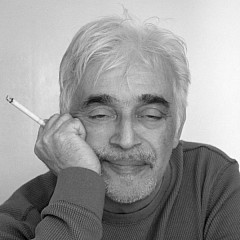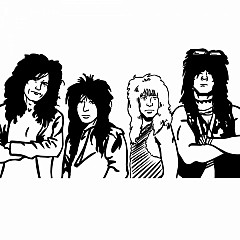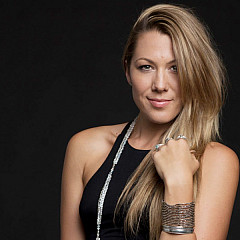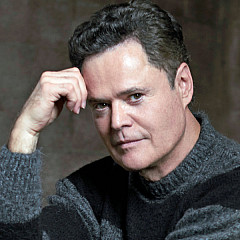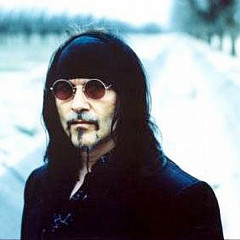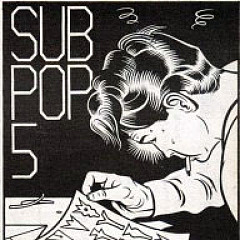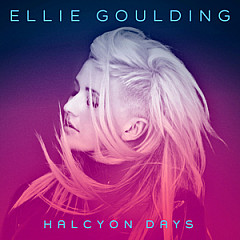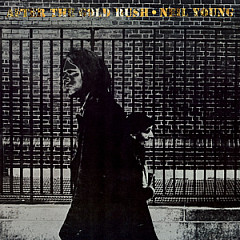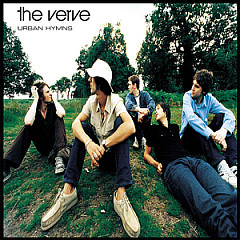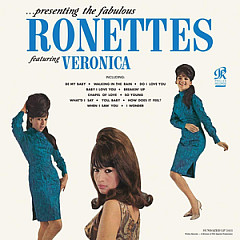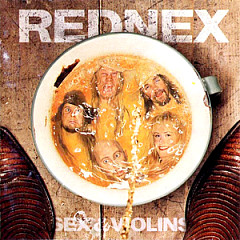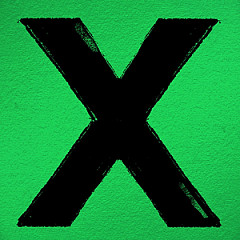But Tiffany is no one-hit wonder. Not even close. Her follow-up was a striking ballad called "Could've Been," which also went to #1 even though it didn't get a video. The song was written by Lois Blaisch, who recorded it in 1983 with George Tobin. It went unreleased, but when Tobin discovered Tiffany, he put her vocals over the original track, and she had her second hit.
The song came out of real heartbreak after Blaisch fell for a guy who was "trouble in a pretty package." It's a song for anyone who wonders what would could've been, and an affirmation that 'tis better to have loved and lost than never to have loved at all. Lois told us the story of the song, and how it fits into her very colorful career.
 Carl Wiser (Songfacts): Would you be able to tell me a little bit about how you got started in this whole business?
Carl Wiser (Songfacts): Would you be able to tell me a little bit about how you got started in this whole business?Lois Blaisch: Well, that goes way back. When I was about 8 years old I was a singing tap dancer in a group of flapper girls. We would perform at churches and old age homes and stuff. After that I was a lead vocalist for the choir in elementary school and right out of high school, I started playing clubs. And then at 18, I went on a USO show tour of the Orient - we went to Okinawa and Korea with Bob Hope's USO shows. I came back and started playing at colleges and nightclubs.
Then I got married. I started recording a lot and all through my 20s I was playing every kind of gig you could think of. I started writing music for Disney and I got songs on three platinum albums. That was cool. Mousersize, Rainbow Brite and Winnie the Pooh.
I started doing shows at the Palomino Club and I had a duo. I was playing with my partner, Alan Graham, in a club called the Hungry Hunter up in Thousand Oaks when Bradley Schmidt and Don McGovern came in and heard us play. I had invited them in and they really loved "Could've Been" in particular.
They worked for George Tobin and George wound up offering me first a staff writer position with his company but then I went down there and played "Could've Been" for him, three times in a row, and he wound up offering me an artist deal on the spot and we recorded the song that night. So, I went into the studio and I recorded the song with a piano player and it came out fantastic. My act that I was working with was not available that night, which was unfortunate, but it was kind of good because the piano player was great – Steve Rucker was his name.
Anyway, the piano/vocal with strings sounded phenomenal and the next day George Tobin called a bunch of studio musicians who were then working for Kim Carnes, and Snuffy Walden was the guitarist at the time. I couldn't come for the first half of the session because I had a family event that I needed to attend - a big family reunion or something. So, I walk into the studio and they had put the bass on and the drums on and they were just putting lead guitars on.
I listen to the track and it sounded horrible to me, absolutely horrible, because it sounded all out of tune. George Tobin couldn't hear this, because he's deaf in one ear. He couldn't tell that the piano was not tuned to A440 but yet the musicians tuned to their tuning machines, so they were all in A440 and the piano was just slightly sharp or flat, but it was making my vocals sound flat.
Songfacts: What's A440 ?
Blaisch: A440 is the pitch at which all studio musicians record albums. It's on the tuning machine – A440. And so, basically they had to not use their tuning machines, they had to tune to the piano, because the piano was in tune to itself. But it was probably flat, I'm guessing, because the strings of pianos don't get tighter, they get looser.
After the guitar solo went, he said: "What do you think of this?" I said, "It sounds terrible. It's all out of tune." He was shocked. He said, "I don't usually let the artist have any feedback at all. I usually just bring them in at the end of the session to put the vocals on." And I said, "Well, you asked me and that's what I'm telling you. It's out. The piano is out from the bass." And then the bass player said, "Well, I tuned to the tuning machine." And I said, "I don't care, it's out." Then George looked at me and said, "Alright, well we'll keep going."
Everybody had to do their parts over again. And, also, the song was written in 6/8 and he had cut the drums in 2/4, which can be done but it's not the best way to do it - you should really cut it in the time signature that it's been written in. So ultimately, George had to redo everything on that track, and then it sounded really good.
He also offered me a contract during that session and put the pressure on me to sign the publishing rights to him, which I usually wouldn't do but he kind of threatened to have everybody go home if I didn't sign the paperwork. So, I wound up signing the paper. I read it but wasn't really sure if it was the right thing to do. But I signed the publishing away of the song for three years - a three-year reversion. Ultimately, he did in fact get me an offer from MCA Records at the time as an artist, but I wound up passing on it because he had a bad reputation in town for being unethical and the deal didn't seem right for me.
But he had the publishing, so three years later he had Tiffany come in and she learned my vocal part and he got her a deal and that song was the second single on the record and it went to #1.
Songfacts: So, you recorded the song as an artist in, I guess, 1984?
Blaisch: It was actually 1983.
Songfacts: And did your version then get released?
Blaisch: It did not because I never got a record deal. I possibly should have said yes at the time because he did have an offer, but people around town were saying words like "scumbag" and "sleaze bucket" and I took them literally and got scared and didn't do it.
Songfacts: Did you do a whole album with George Tobin or just this one song?
Blaisch: I recorded about three or four songs. We recorded two of my songs. There was another song called "Push Button World" and then he had me sing I think a Natalie Cole song, since he had worked with Natalie. He was trying to get me a deal at the time and when I didn't take the deal we didn't work together in terms of making an artist. He had earned the publishing rights to "Could've Been" so he kept the song and then when Tiffany came along a couple of years later he just had her learn my vocal part of the song, even though it was theoretically the demo that became the record because I told him how to fix it, which he did. He listened to it and had the players re-play it to the piano and they changed the drum part to 6/8, like I suggested.
I co-produced the record because I had so much input on it, and he knew it because when he mastered the song he called me in to give my approval before he released it.Songfacts: So, all those tracks - the piano, the drums, all that – were done in 1983? It was just Tiffany's vocal that was put on top of those?
Blaisch: Correct.
Songfacts: And he called to bring you in, so you knew this was going on?
Blaisch: Well, he called me in 1987 because the publishing rights were about to revert back to me on the song. He said, "I need you to re-sign this agreement with me because I have an artist that I just got a deal for and we want to put your song on the album. And so, will you re-sign the agreement."
I was left with this decision to make on a song called "Could've Been." I already had the feeling that, it could have been my record deal but I already passed once on this and I don't want to sit around, if this is a big success, and say, "It could've been a song on the record."
So, I ended up making a deal with my then attorney, who was Neville Johnson. It was going to be a split publishing deal if it was just on the album but they would get 100% of the publishing if they made it a single. So, that gave George Tobin the incentive to make it a single, which is probably why, ultimately, he made it a single, plus the fact that it was a really good song. But, it was about time I finally said yes to something because it's easy to try and do the right thing and take the right deal and say no to a lot of bad deals, but there's more bad deals being offered than good deals, unfortunately, in the music business.
I knew for a fact that he was not going to put that song on the album if he couldn't get the publishing rights on it because he told me so.
Songfacts: What inspired the song?
I went out with a guy. We went to the Hungry Hunter on our first date. He was a recording engineer - I had done a session with him, and that night he said to me at the end of the date, which was a very successful date, "I have to give you a warning about me, I'm a jinx." And I said, "Really? You don't really believe that do you?" And he said, "Well, I didn't but things have happened." I said, "Okay."
Sure enough, over the next two or three weeks after starting to date this guy, things began to happen. Bad things happened, one thing after another. My house was robbed. My car was stolen with my guitar in it. They tried to break into my house. And I was thinking maybe this guy was right and he was a jinx. We ultimately wound up breaking up but this bad luck kind of lasted into the next relationship with the fellow that I actually did write "Could've Been" about, an oral surgeon. And that relationship went south in a big hurry.
Ultimately what was weird about The Jinx is that all that bad luck that happened during that time led me to the grief that inspired "Could've Been" because I was so upset about everything and the loss of this next relationship. And then I wound up writing that song that contained my pain because I was so in pain about everything. I wound up singing it at the Hungry Hunter, which was the very place that The Jinx took me on my first date. So, The Jinx brought me to my lowest low and that, ultimately, resulted in my highest high.
Songfacts: But it was the oral surgeon whom you actually wrote the song about.
Blaisch: It was. But there was a lot of events in my life, things were just falling apart because I had been robbed, the car was stolen, the guitar was stolen - it was a lot of things. The oral surgeon would say, "Why don't you just get a job? Why do you have to play music for a living? Why are you suffering so much in the life of a musician when my receptionist makes more money than you?" So, it was just sort of the fallout from the whole thing with The Jinx that kind of had an ill effect on that next relationship.
One thing had an impact on the next. It was sort of in disrepair from the relationship before and that led to the demise of the next relationship. That guy was also a big talker. The oral surgeon guy was full of bullshit and led me to believe he was going to finance my career and all this stuff, and I bought the whole thing, which is actually what inspired the lyric of "Could've Been" because what I fell in love with was not necessarily him but all the things that he promised - all the big lies and the bullshit. He probably was just trying to score. I don't know.
So, I didn't really fall in love with him, I fell in love with what could've been.
Songfacts: That's a very mature outlook because you're seeing that going through this is better than not having been through it at all.
Blaisch: Well, that's what the bridge of "Could've Been" says:
Still what could've been is better
Than what could never be at all
Songfacts: Yeah, that's a beautiful line.
Blaisch: Thank you. It wound up hitting a lot of people in their gut because you have to take a risk when you fall in love. You open your heart to someone and it might not be right, but if you don't try it you'll never really find out what can happen.
Ultimately, it wasn't the right guy. I thought it was the right guy because he was handsome and he was rich and he talked a good game, but deep down inside he was just an asshole. He was trouble in a pretty package. He just said what he needed to say to get what he wanted, and he didn't really know who I was.
I think a lot of people have pain that they hold in their hearts about something they wish could have happened and they wonder what would've happened if they had done something different or if the relationship would have manifested, and they never know if that would have led them to a better place. But, ultimately, you don't know, do you? You could look at it like if I married that person I could be dead today. That could have been the wrong choice.
I'm very happy today. I'm married and I have two beautiful kids and I own two properties and I'm doing well, so I guess the oral surgeon wasn't the right guy for me. But it was my first heartbreak after my first marriage ended. You just fish around and you hope to get it right and you keep opening your heart up and trying to make it work, and it doesn't work always, does it?
Songfacts: Lois, this song shows a lot of songwriting chops. It really grabs you quickly - within the first 45 seconds you're hooked. You have that great opening line where the flowers are about to die, and then you get the name of the song in and then it gets into the whole verse re-repeating. This is like a master class in songwriting. Were you thinking this through when you were doing that?
Blaisch: I was looking at the flowers that the guy gave me, dead on the table, and it felt like my heart was dead like those flowers. I couldn't sleep and I couldn't eat and I was pretty devastated because he led me to believe that this was going to happen and then really quickly he just broke it off.
I wound up editing it down a little bit, which was a really good thing. I think it was probably a good move to cut out the second chorus and go right from the second phrase because the third verse goes right to the bridge, which is kind of unusual for a pop song. But it made it shorter, made it more radio friendly - they like shorter songs on the radio.
But, was I thinking about it at the time? No, I was not thinking about writing. I was completely coming from a place of pure honesty and pure pain and pure "get this pain out of my heart so I can continue with my life." I just needed something to hold the pain right then because I was really hurting.
Songfacts: It's interesting to hear that the flowers were a literal image. Songwriters spend a lot of time trying to create those images, and there you had it right in front of you.
Blaisch: They were sitting on the table. I was looking at the dead roses thinking, "Well I guess our song is over." I thought it was just starting, but it was already done, the song representing our whole relationship together. I thought it was going to be a long, happy relationship, and it was already over.
So, it was just an illusion. I fell for something that wasn't real. It was empty promises and the illusion of wealth and prosperity and somebody who loved me for who I was, but he didn't even know who I was. He was just a good-looking fast talker, wealthy guy who wanted what he wanted and got what he wanted, I guess.
Songfacts: What was it like when Tiffany takes off and you've got one of her biggest songs?
Blaisch: Well, it was pretty fantastic but it was also like half a dream come true for me because my dream was always to be the artist, because I'm a singer. I was a studio singer - I sang on television themes to three or four of Mike Post's TV shows: Stingray and Hunter and all these. I sang on Splash, and I sang on some of the Disney albums and I sang on about 20 jingles and a whole bunch of different people's albums.
So, my dream was to be the artist, but because I'm a writer and I'm a musician and I'm a producer as well as a singer it took me longer. Plus the fact that I didn't ever have a backer so I had to earn a living while doing all this stuff. So, it took me until my mid-20s to where I was ready to really be an artist, but the business was revolving around teenagers at the time. It still is.
When I realized that the song was moving up the charts quickly, I looked at my sister and I said, "Want to go to Paris?" And she said "Yes, let's go."
There was a big music business trade show called Midem that happens every year in the south of France and I did have a couple of guys I was working with at the time, Frank Mayer and Dennis Dehgar were the fellows' names. I had recorded a few things with them and they wanted me to go. My sister and I got on a plane the next day and we flew to Cannes and went to meet them, and while we were there the song went to #1 worldwide.
It was amazing because all of a sudden everybody was after me to sign with them. I had all these different representatives who wanted me to sign with them but I was in conflict because I had two different people, a film and TV rep, that wanted me to sign with them and then I had these guys that I had just done recordings with who wanted to sign me. I was trying to be ethical, which was probably stupid, but I didn't know what to do so I kind of froze and wound up getting one offer for a publishing deal, which in hindsight I should have taken. But at the time I still wanted to be an artist so bad that I thought, "If I sign away my publishing, who's going to want to sign me as an artist when there's no publishing left?" So, I didn't wind up taking that, which I still kick myself about today because it was with Arista and probably would have been a lot of money. So, there you go. Admitting another could've been.
Songfacts: You said that you signed away the publishing to the song. Did it ever revert back to you?
Blaisch: No. What I want to make really clear is that I did not write this song for hire. This song was written a year before I met George Tobin and there was a clause in my contract that says the song was written for hire, which means that he hired me to write the song, which means that he owns the publishing forever. But right now I've paid a lawyer a thousand bucks because I'm trying to get the copyright back to the song because I can prove that it was not written for hire and the publishing rights should by law be reverting back to me.
He owns the publishing rights right now but we're in a legal process to try and get them back because there is a copyright law that protects artists that are poor. The person that came up with the concept of Superman, I think it was two guys, went and sold the rights to Superman for a hundred bucks and then it went on to make millions for everybody. I think it's called copyright reclaim, and this is supposed to protect artists that are in that bind. Except now my problem is that it's going to cost so much to hire a lawyer to get the copyright back and I don't know if there's enough royalties out there to justify a lawsuit. So, I'm in a bit of a bind trying to figure out what to do next about that.
Legally, I should be getting that song back after 30 years, and it's coming up on 30 years.
Songfacts: You still earn royalties as the songwriter on that, don't you?
So, it really puts me in a bind because it's out there. There are three or four artists in the Philippines that recorded it. One artist had a double platinum album, her name is Sarah Geronimo, and I'm not happy with her because she did not get permission to use my song and did not pay me for it. Christian De Walden produced that record and I'm still waiting to see something but I don't think I'll ever see it.
Songfacts: Were you watching American Idol when Carrie Underwood did the song?
Blaisch: Yeah. A friend of mine called me from Canada, and it's a different time zone up there. Lisa Kathryn Calder called me and said, "You have to watch American Idol tonight because this artist just did your song." So I knew it was going to be on that night and I recorded it.
So, that was kind of exciting that that was Carrie Underwood's choice and not something that somebody else asked her to do. I give her credit for having great taste, she said immodestly.
Songfacts: Well, what did you think of the Tiffany version of the song, of her vocal?
Blaisch: Oh, I thought she did a great job on it. You know, she was 14 years old and I thought it was pretty amazing that she could sing that well at 14. The album was not released until she was 16. It was wise of George to have her copy my phrasing exactly because in essence I got to produce the vocal. If I was in the studio with her I would have said, "Sing it exactly like this." She sang it exactly like me, and Carrie sang it exactly like her. So, I got to really have a major hand in how that song was done because it was done exactly like I did it.
Songfacts: What did you do for Splash?
Songfacts: I didn't realize that wasn't Donna Summer singing that in the movie.
Blaisch: No, that was me. I was doing a lot of studio work, and I'd love to do that again. I'm doing some session work but not as much as I did then.
Songfacts: What did you think of the session work that you did?
Blaisch: I just loved it, because I love singing more than just about anything. The style at the time was Linda Ronstadt and artists like her. Now it's a much lighter sound in terms of the vocals - people sing in their headspace more.
I was a great studio singer. I went in there, I got the job done quickly. I can read music. I think probably the hardest thing about the studio work is when I heard a better part. I had to be careful sometimes because I didn't want to insult somebody in terms of making my suggestion like, "You know, there's something better that could be done here." And sometimes they would let me and I would actually improve things for them. Actually, that happened many times where I would be in the studio and I would hear what the problem was, because I have great ears, and I would be able to fix it.
So I would say that I love doing studio work. It's one of my great joys and if I were to count how many sessions I've done, I would think it would be thousands. I sang on an Oasis album. I sang on the Neil Young Hundred Voice Choir.
Songfacts: That was for his Living With War album, right?
Blaisch: Yes.
Songfacts: Was that literally a hundred people that he had singing?
And it was really funny because all the pro-George Bush people, which were many studio singers in Hollywood at the time, those people were not called for that session. It was all the left-wing people who were not happy with the Bush administration who were happy to go in there and sing all these lyrics that were just politically incorrect at the time in questioning the presidency.
Songfacts: So, the whole point of getting 100 people was to create a feeling that there's a mass speaking out.
Blaisch: Yes, and he wanted a show of support from 100 singers in the studio. We also sang "America the Beautiful," which was one of the songs on the album. A beautiful arrangement of it. There is a video that exists of all of us singing "America" as well as all the other dozen sort of anti-war songs and anti-Bush songs.
So, yeah, I love to do a singing session. Now that I've raised my kids I want very much to go back into it full-time, as much as I can.
Songfacts: Did you make the bulk of your earnings doing session work?
Blaisch: No. The bulk of the money came from "Could've Been." I only made the songwriting royalties on that song but when you have half of something that big, it's a lot of money.
If you're a person that wants to make a living in the world of music, you have to be able to look at all the different things that you can do. I have three Grammy nominations, including one in jazz for Earnestine Anderson, which was an album produced by Quincy Jones - a song I co-wrote with Robert Martin. I did weddings, I did Bar mitzvahs, I did colleges, I produced festivals where I hired all the bands, I produced recordings where people hired me, I'm a recording engineer. You have to do a lot of stuff. I'm a guitar player, I'm a piano player, I'm a bass player. So it wasn't only one thing.
Songfacts: What is your favorite part of the job?
Blaisch: I love having a voice that can connect with the world on a massive scale. When I was at the Universal Amphitheater and everybody was giving Tiffany a standing ovation and they were holding up their lighters – it was a while ago, now it would be their cell phones – I thought, People worldwide have been touched by this song. They've felt something. They've felt maybe better that somebody else has gone through that. So, to be able to communicate with the world is pretty awesome and I really, really hope I get to do it again because it's pretty special to be able to connect even once with the whole world.
Songfacts: Wow, that's tremendous. That must have been quite a moment, when you're at the show and she's singing your song.
Blaisch: Well, that was pretty great but it was even greater when I was at Needham and my song was #1 worldwide, not just in the US but it was in Britain, and in Canada. It was on all the charts worldwide, and the people from BMI said, "Why don't you call your parents and tell them that you have written the #1 song in the world?" And it stayed there for two weeks, #1 pop, #1 adult contemporary. So that was pretty fantastic, even though I wished I had sang it.
Songfacts: The first Tiffany hit was a song from the '60s that was really catchy and just repackaged in a really good way. It also had a video. "Could've Been" was an original song, so nobody had heard it before, and I don't remember that ever being on MTV. I don't think they made a video for it.
Blaisch: Yeah, they didn't make a video and there was a reason why: because she was 14 years old and people felt that she was too young, especially if they looked at her, to really convince them that she had been through that. And she had not been through that - she was 14 years old. She hadn't yet had a heartbreak that severe. So she never did make a video on that song.
Songfacts: Oh, interesting.
Blaisch: Here's an interesting thing about me. I have only had maybe six to ten of my songs ever cut, but of those songs they've all gone huge, they've all been platinum, they've all been hits, and so I think I probably haven't said yes enough to these deals because I do get offers. When I do say yes, these songs fly far, really far. So, perhaps I've been too cautious and I haven't submitted my stuff enough and taken enough of the offers that I've gotten in my life. So, anybody out there who needs some material, I've got some great stuff.
I also want to say one thing more and that is I have a beautiful 18-year-old daughter who's an amazing singer and songwriter, keyboard player, guitarist and graphic artist who is now co-writing with me, and I predict that she is going to be an amazing artist someday. She's like me but better.
December 12, 2016
Further Reading: Our Interview With Tiffany
More Songwriter Interviews

